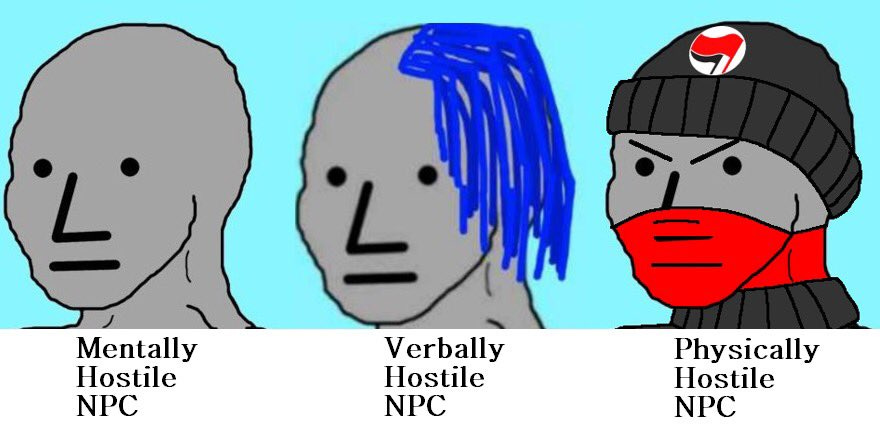Why Sapience is not Universal
The NPC meme is a vibrant description of how thought appears to be an emergent property of language
I love the NPC meme. It expresses so succinctly the reality that we live in a world where there are those capable of self-actualized thought, and those that are nothing more than programmable drones. Transcendent humanity expressed in contrast to obedient social machines.
The Woke Left despises this meme. For those not in the know, NPC stands for “non-player-character.” A “player character” is a character in a videogame (or ttrpg) that is controlled by a human player. An NPC is a character that is programmed to give set-dressing to the world but merely simulates agency. They’re soulless automata that behave as programmed. Yuri Bezmenov explained this phenomena in a political context exquisitely.
This meme encapsulates a distinction without effective definition; truth difficult to articulate. While the meme is somewhat passé in popularity now, it provided insight to more deeply evaluate what is consciousness, sentience, sapience, and where those traits originate from.
Definitions
Consciousness is the ability to be aware. Virtually all animals with a central nervous system are conscious.
Sentience, is the ability to understand that the self exists. Dogs are sentient, most higher forms of life are aware of the self, and the existence of beings that are not-the-self.
Sapience is the primary point of contention that separates (some of) humanity from the rest of the animal kingdom. The dictionary definition of sapience is: The reasonable soul; the intellective faculty; that which distinguishes men from brutes; reason.
Sapience is in essence, the ability to intellectually transcend the physical and comprehend the abstract. The ability to abstract the self, the world, and reality in a way that it can be communicated through verbal construct. The world we live in today exists because of a few very clever sapient individuals who learned to conquer the physical world through the abstract ideas of number and measure.
Language as the Spark of Sapience
Some number of years ago, I encountered a brief snippet from National Public Radio (NPR). While their programming is frequently flooded by establishment vitriol, this particular bit was called radiolab. The section was called Words. Likely recycled from its original publication date in 2010.
During the piece, individuals engage in a discussion about several scientific and anecdotal studies on the nature of language. One man, who was deaf, never learned language until his late twenties. It took weeks of work for him to realize that it was possible for language to include abstract ideas. The concept that “things can have names” radically altered the mans ability to learn and understand the larger society.
A second experiment was done which required the use of both visual color processes in the mind and spatial reasoning. Animals scored an anticipated 50% success rate. When conducted on full grown adults, they scored a 100% success rate… unless they were talking during the test, in which case it dropped down to 50% success. Language, and the neural network of language, it seems, is what permits different regions of the brain to communicate abstract ideas. Ideas like “left” or “blue” or “twenty seven” require a language for the mind to understand.
Sapience is an emergent property of a complex brain that can speak. The essence of sapience is the capacity to understand a natural language which contains abstract ideas. A learned language forms a network inside the brain. That linguistic network combines complex ideas and acts as a communications channel between different regions of the brain. Using the linguistic network, different regions of the brain may observe one another and model behavior.
We experience that emergent phenomena as sapience. It is generally experienced as an internal monologue. A monologue that allows one to comprehend and consider abstract ideas of a complex nature. Without the linguistic network, different regions of the brain do not have a means to communicate directly, thus sapience does not emerge.
This leads to several interesting conclusions:
Sapience is on a spectrum, with some individuals more sapient than others depending on the complexity of their neurological linguistic networks. The more complex the language network, the more sapient an individual is.
Some languages generate more sapience than others. English, containing the most words of any language on earth and hosting some of the most complex abstract ideas, leads to more sapience than other languages.
Speaking multiple languages (including mathematics and other symbolic languages) makes one more sapient.
Those incapable of an internal monologue, and those who suffer from aphantasia, are lower on the sapience spectrum than other humans.
Those who completely lack an internal monologue not interact with an abstract reality, merely a physical one.
The following video and related publications were produced as of 2025… and seems to support this theory of sapience.
Life among NPCs
Cognitive sapience requires complexity and abstract language. Those who lack sapience, or are minimally sapient compared to other adult humans, seem to make up a reasonable percentage of the population. The traits of the NPC are relatively well understood:
Lack of self-awareness
Limited capacity for abstraction
A willingness to blindly adhere to authority
An incapacity to recognize realities that are not in their immediate surroundings (often phrased as, “that doesn’t matter, I can’t see it.”)
That said, there is yet to be a scientific barometer when it comes to these behaviors and even some highly educated individuals can exhibit them. There is evidence that people have occasionally snapped out of an insapient haze and awakened to the existence of abstract reality later in life.
The sentiment of: “I didn’t realize that speaking inside my own mind was possible” has been seen from time to time.
Cognizance requires language and the development of an abstract reality and an abstract self. Sapience is an emergent property of a natural language. This is why society grew more complex in tandem with our development of language. Not because complex language emerged from a higher complexity society. Rather higher complexity language makes a higher complexity society possible. Written language likely radically altered the mode of being for a huge number of people in the population. Language is one of the easiest technologies to point to that has made us more human.
With the internet, I suspect, many new people were awakened to cognitive abstract modes of being. Particularly so in the universality of the written words preeminence above the spoken word online, along with a vast quantity of new linguistic and memetic information. Corporate AI are trying so hard to eliminate massive portions of the modern internet and replace it with a cyber-potemkin village. A general awakening to sapience is dangerous. Thus most leaders hope to put people back to sleep and sterilize the open vistas of the early digital era. Preserve and archive what you can, while you can.








I would imagine you've seen the "Breakfast Question" greentext, so I won't paste that here. But here's a related thing. It's concerning intelligence, not sapience, but it's still a stark reminder that there are vast gaps in cognitive ability between different people. If you're on the far right tail of the bell curve, like I am, you might not even truly understand how stupid the average person is, and things like this are a useful reminder of it
https://www.unz.com/akarlin/stupid-people/ tl;dr: the average scores on worldwide mathematics tests are shockingly low because everyone is stupid. One of the first things in that post, for example, highlights that ~10% of Americans, and ~50% of people worldwide, are incapable of reading a chart.
For a supporting anecdote, one of my first blackpills on the subject of human intelligence was way back when on Reddit, back in the glory days of the early 2010s where everyone was screaming about "income inequality". People were passing a graph around that looked approximately like this:
https://files.catbox.moe/n2b29f.png
People were passing this graph around as proof that the rich are getting richer and the middle class is fucked. But if you use basic critical thinking skills, and your eyeballs, look closely at the graph.
What it's actually saying is that a bunch of the people who made 50k in the 1950s make 100k now. What the chart was actually saying is that _the middle class got hollowed out because they're all rich now_, and NOT that the same small set of rich people got richer.
In other words, people were sending this graph around to argue that the middle class is getting fucked, and using it to demand that the middle class get more resources. But what the graph actually shows is that the middle class got so many resources that they graduated to upper middle class, EXACTLY THE THING BEING DEMANDED
(Note: I have no idea if the graph was true and accurate to reality or not. But that's not the point)
The point is, people had a chart right there in front of them that clearly said one thing, but then some dude tweets saying that the chart says the opposite of that thing, and everybody just spread the chart around saying that it proved the opposite thing. Even when the data is right there in front of them, the average _Redditor_ (who, joking aside, are going to be smarter than the average American because stupid people don't have jobs that let them post on Reddit all day) is _**incapable of reading a basic chart**_.
Because the average person is barely smart enough to qualify as a person. If you are an above average person, it's very very very important to remember this, if for no other reason than that if you put unreasonable expectations on people not smart enough to satisfy them, you hurt both yourself and them
Data points:
animals being sapient-
https://www.youtube.com/watch?v=z6GMhwyKlhc
https://www.youtube.com/watch?v=WYBATyILJD8
It's long been observed that a dog with average IQ (60?) is more practical and capable of logical actions (if not thought) than leftists.
humans not being sapient-
Depending on which source and how it's defined, somewhere between 15% and 50% of humans do not have an internal monologue. There were also studies on at what age human children developed sentience. Unfortunately they separated the subjects by race, so uncomfortable results followed so it was shut down. IIRC, it was something like the average Canadian injun still hadn't developed self-awareness by 15.